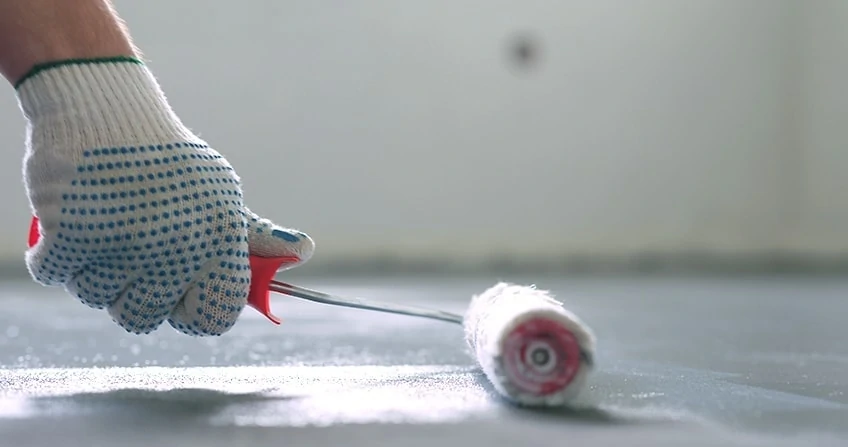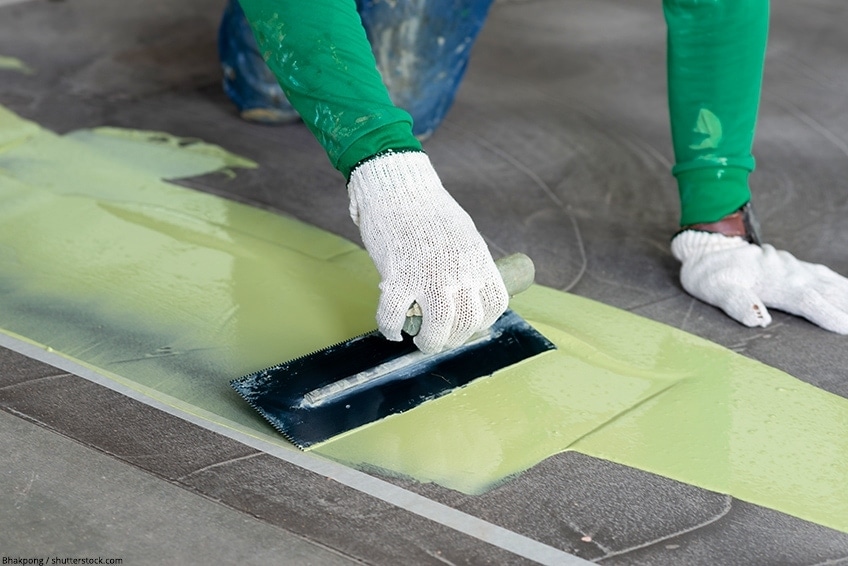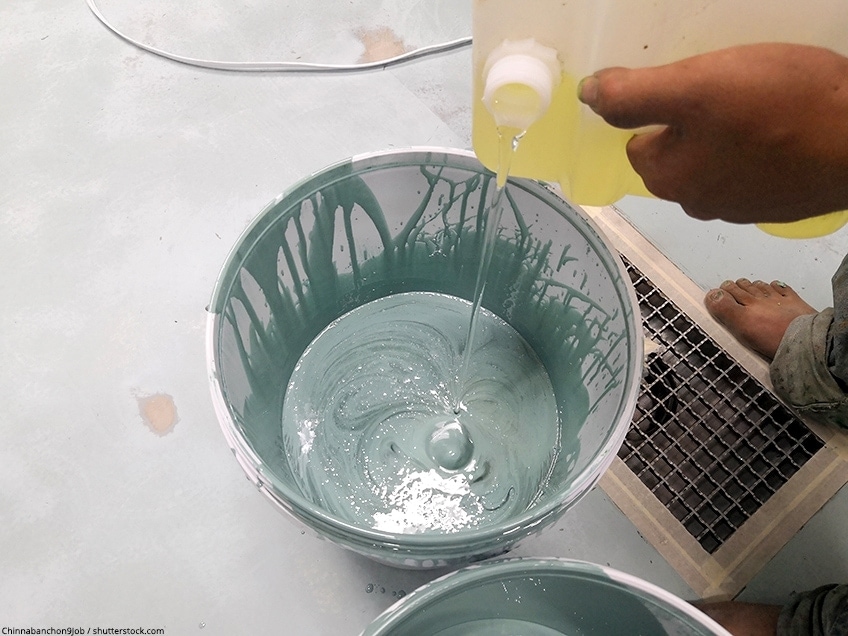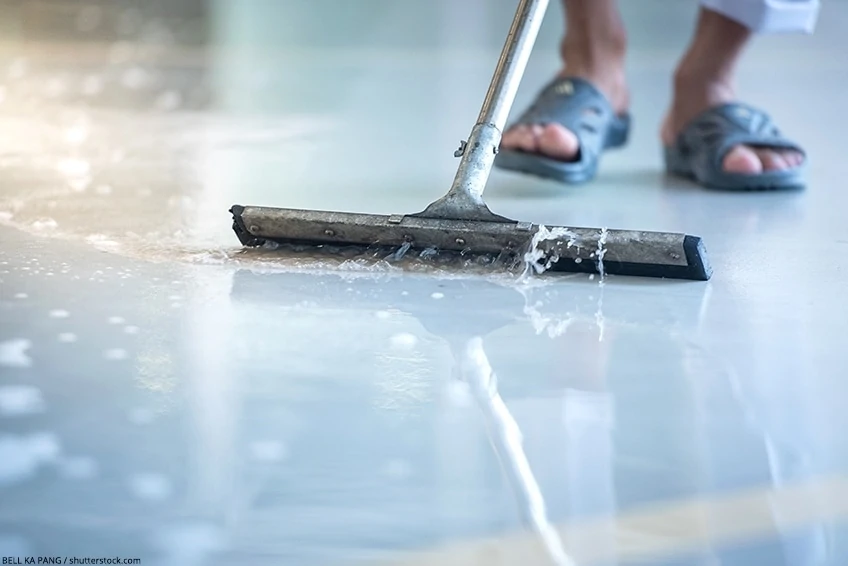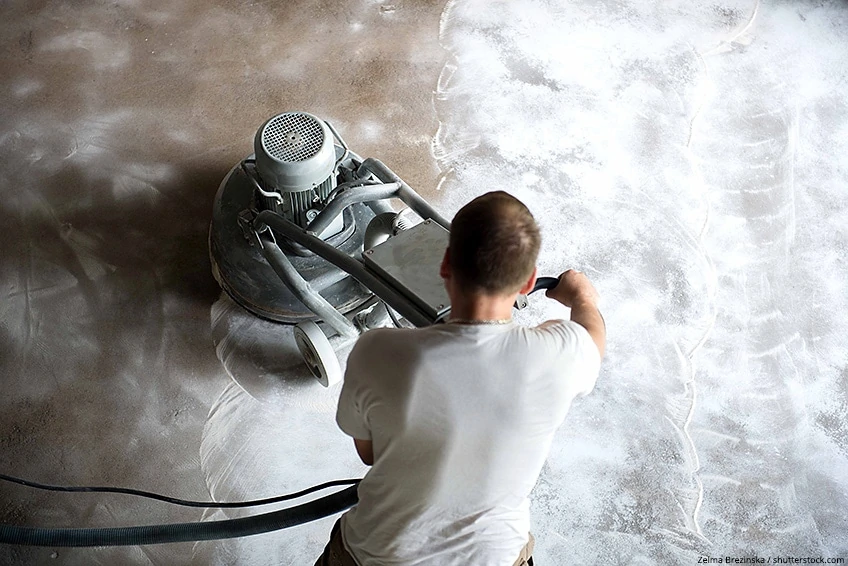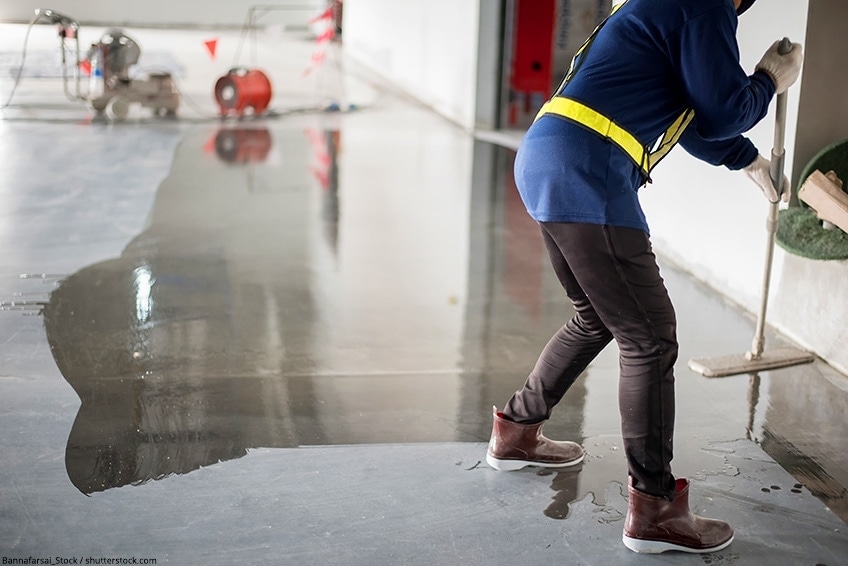How to Seal Concrete – In-Depth Guide for Best Results
This post may contain affiliate links. We may earn a small commission from purchases made through them, at no additional cost to you. You help to support resin-expert.com
Concrete may be an incredibly durable material, but this doesn’t mean it stays perfect throughout its life. Whether you have concrete floors, patios, driveways, countertops, pool decks, or other surfaces, the concrete will eventually start to show signs of wear and tear. Concrete is often used in very high-traffic scenarios, so it is designed for heavy use. Because of this, concrete sealer should be used. The best concrete sealer will help to maintain and protect the concrete surface from damage and unsightly marks while adding an attractive finish to keep the surface looking brand new. Read on to find out more about concrete sealants and discover the best products out there.
Table of Contents
What is a Concrete Sealer?
A cement sealer is a specialized finish product that is applied over all types of concrete surfaces. Exposed concrete surfaces may hold their form for a long time, but they can quite easily get damaged by water, dirt stains, salt, oil, chemicals, freeze/thaw cycles, and other damaging forces. The main type of damage to concrete results from surface moisture intrusions. If you have decorative or exposed concrete, adding a sealer will help to protect it from this.
Cement sealers maintain the look of the concrete by adding a protective weather-proof layer over the surface. Over time, this may start to wear away and show signs of damage. If this is the case, a new sealer can be easily applied to completely renew the look of the concrete. Different concrete sealers offer different types of protection and different looking finishes. The type that you choose should be based on your specific project and concrete protection needs.
So, the best concrete sealer will enhance the look of the concrete, while adding a durable layer of protection. Not only does this help to keep the concrete looking fresh, but it can also provide important structural protection against any damages.
Different Types of Concrete Sealants
If you are looking for the best concrete sealer, you will notice that there are loads of different products to choose from. There is a range of different brands, products, finishes, and styles available. However, there are two main categories that this product falls under. Within these categories, various other options are available. We will outline the basic types of concrete sealers below.
Penetrating Concrete Sealer
Concrete has a porous consistency. This means that it has many pores that can absorb and retain moisture. As a major source of concrete damage results from it absorbing and holding water, this is something that sealers aim to prevent. A penetrating concrete sealer sinks into the surface of the concrete and forms a reaction. This results in active ingredients bonding with the blocking substance in order to block the pores.
Penetrating concrete sealer is considered a reactive substance. Instead of creating a visible film over the concrete, this type of sealer often does not really change the appearance of the concrete. It is more about blocking the pores and reducing their ability to take on water. Applying a penetrating concrete sealer will generally last for about five years or longer.
Topical Concrete Sealer
This type of concrete sealant forms a coating over the top of the surface. Topical sealers have excellent adhesion qualities and basically act as a kind of barrier over the concrete. This protects it from any moisture penetrating the surface of the concrete, as well as provides protection against stains, corrosion, and chemicals.
A topical concrete sealer does not just add a good layer of protection over the concrete, but it also changes the look of its finish. This type of finish dries to a clear, shiny look that will make the concrete maintain a brand new looking finish. Different products will have different aesthetic finishes. This type of sealant will also affect the surface of the concrete. Particularly when wet, the sealant can get slippery (as opposed to grippy concrete). Because of this, there is also the option to add in an anti-skid substance to improve its traction.
Other Types of Concrete Sealers
While there are two main categories of concrete sealers, there are still more options that fall under these two categories. We have outlined them below.
Acrylic Concrete Sealer
Acrylic concrete sealers form a thin coat of protection over the concrete. This is a cost-effective option that is easy to apply and versatile in use. Acrylic sealers can come in the form of being solvent-based or water-based. You can also choose between various different sheen options here depending on the type of look you want to achieve.
Acrylic sealers can offer UV protection for outdoor use, and they work very well as a stamped concrete sealer. They are also fast-drying and offer a good level of protection against salt and moisture. While acrylic sealers are a good choice for outdoor applications, they are also a bit thinner. This means that they will need to be reapplied sooner than epoxy or polyurethane sealers.
Polyurethane Concrete Sealer
Polyurethane is a thicker and more resistant type of sealer than acrylic. This can be either water-based or solvent-based, and it can also come in a variety of different sheen levels. Polyurethane can work well outdoors as well as indoors, thanks to its durable and non-yellowing properties. This is a clear finish that can be used over floors and countertops. The finish works well over colored concrete, stamped concrete, and exposed aggregate concrete.
Epoxy Concrete Sealer
Epoxy offers a thick and durable sealing solution. It is water repellant and can come in a glossy finish that is clear or tinted. An epoxy sealant is a great choice for busy flooring areas that require superior resistance against abrasion. Epoxy should be used indoors only though, as it is not UV resistant and will yellow after some time. This type of finish is also not breathable, so any trapped moisture will not be able to escape. Epoxy concrete sealers generally come in the form of a two-part product.
Benefits of Using a Concrete Sealer
Using a concrete sealant is necessary for a range of different concrete surfaces. It can be used over fresh concrete on new builds, or for renovating old and worn concrete surfaces. Some of the advantages of using a sealant are:
- A concrete sealer protects the surface against moisture, salt, stains, and damage. This keeps the concrete stronger and helps to prevent wear and tear
- You get a longer lifespan from the concrete
- The appearance of the concrete is enhanced
- You can choose between various different finishes and color options for different types of concrete surfaces in order to achieve the look you are going for
- Sealed concrete is easier to maintain and keep clean
- Any color or fine details of stamped or exposed aggregate concrete is better protected
When to Seal Concrete?
The best concrete sealer can work wonders over your driveway, countertop, or any surface that needs sealing. However, this doesn’t mean that all concrete surfaces should have a sealer applied. While there are plenty of different sealer options out there, suitable for different surfaces, only a few types of concrete areas really need a sealant applied to them.
Surfaces that do not require a sealer are any vertical concrete areas (walls, pillars), any non-functional surfaces (such as sculptures), or any place that isn’t a wear surface and does not attract frequent contact and use. Concrete is a very durable substance, so if it is not in use then you don’t necessarily need that extra coat of protection.
Any type of concrete floor should definitely be enhanced with a sealer, as well as any busy surfaces – such as countertops or furniture. A stamped concrete sealer should always be used, as the sealer will help to protect but also greatly enhance the appearance of stamped concrete.
The main thing to consider when choosing the right product is what type of surface finish you are looking to achieve. You can get a deep penetrating concrete sealer that offers superior protection but doesn’t enhance the appearance of the concrete much. Then you get sealers that are applied as a film over the top of the concrete – offering a shinier, more enhanced appearance.
How to Choose a Suitable Concrete Sealer
The best concrete sealer really just depends on your specific project and requirements. Before just choosing any product, a few important considerations should be taken into account.
Water-Based or Solvent Based Concrete Sealer
One of the key considerations when buying a concrete sealer is whether you want it to be water or solvent-based. A solvent-based concrete sealer dries to a glossier finish and enhances the color of the underlying concrete better. These sealers have excellent adhesion and durability properties and last for a longer time. The downside to solvent-based products is that they are less environmentally friendly, contain a higher level of VOCs, and often emit strong odors while being applied.
Water-based concrete sealers are more eco-friendly, contain fewer VOCs, and are safer to work with. These are more suitable for kitchen counters, as they are safer for use around food. They are also easier to clean up, non-flammable, and don’t have any strong odors when working with them. When cured, water-based sealers dry to a less glossy, matte finish.
Penetration
As mentioned earlier, concrete sealers can just form a film over the surface of the concrete, or they can penetrate deeply into the concrete. Ideally, you want a deep penetrating sealer for best strength and protection against moisture retention. These types of sealers work best in high-traffic areas outdoors. However, some people prefer to get a sealer that is focused more on the type of finish that it produces. For this, an acrylic concrete sealer is best.
The type of concrete sealer should depend on the type of surface you are working with. For example, using a solvent-based product is best as a polished or stamped concrete sealer. This is because the solvents sink better into the pores of this concrete. Water-based concrete sealers are usually better suited yo indoor surfaces, as they are
Reapplication
Even the best concrete sealers require reapplication after a while. When applied to busy concrete areas, sealers will last a few years before they start to fade away and need a replacement. When choosing a concrete sealer, this is always an important consideration. More premium, expensive products will certainly last longer. Just be sure to check out the specific product details on this point. Resealing can be an expensive and complex job, so it is important to consider this when looking for a concrete sealer.
Climate
The two main elements that damage concrete is water and salt. Moisture can seep into the concretes pores, and cause cracks in the surfaces thanks to the freeze-thaw cycles. Salt will weaken and corrode the concrete. This can result from sea spray near the ocean, lawn chemicals, ice melt, or other sources. If moisture or salt or serious concerns in your climate, then try to get a deep penetrating concrete sealer for the best protection.
Final Finish
Different sealants offer a different type of finish, which can affect both the aesthetic and the protection of the concrete underneath. Be sure to choose a finish that is right for your scenario. For external concrete, the sealer should offer UV protection to prevent yellowing, it should be water-resistant, highly durable, and breathable to release trapped moisture. You might also want a finish with anti-slip properties so that it does not become slippery when wet.
You could choose a penetrating sealer for great protection while keeping the concrete looking basically the same. Or, you could choose an acrylic concrete sealer for a fresh look on the surface. This can come in various sheen options, from high gloss concrete sealers to matte ones. Interior sealants don’t need to offer UV protection, but they should still be water-resistant and durable enough for the purpose. Epoxy and polyurethane finishes are a good choice for countertops, while acrylic works well on the flooring. Again, you might want high gloss concrete sealers or dull ones depending on your taste.
How to Seal Concrete
Now that you know all about cement sealers, and can find the best concrete sealer for your needs, it’s time to apply it. While this process differs between products, here are some general guidelines on how to apply the sealant:
- Clean and prepare the surface: Before adding any sealer, make sure that the concrete surface is free from any dust, dirt, or stains. It will also need to be stripped of any existing sealants. Some sealers can only be applied to dry concrete, while others work on damp or dry surfaces. Be sure to check the specific manufacturer’s guidelines on this before proceeding.
- Apply an etching solution: For best results, particularly with a deep penetrating sealer, an etching solution can be applied to the concrete first. This will help to open the concrete better.
- Application method: Before you apply the sealer, you will need to know how this will be done. There are a few different options here, and the application should depend on your specific product and type of concrete finish. A concrete sealer can either be sprayed on, brushed on, or applied with a paint roller. Make sure that your equipment is set up and ready for whichever method you choose.
- Apply the first coat: Start with a thin coat of sealer. Apply this evenly across the concrete surface and wait for it to dry completely.
- Apply the second coat: When the first coat is dry, you can apply the next one. This should be done in the opposite direction that you applied the first coat. Again, wait for it to dry completely. Now you might be able to use the concrete, or you may require additional coats. This depends on the product and type of finish that you are going for.
- Drying: The sealer needs to be completely dried before you walk on or use the surface. This can take up to 48 hours (but is usually quicker) depending on the sealer used.
Frequently Asked Questions
Which Concrete Sealer to Choose?
This should depend on the surface that you are sealing and the look you are going for. Driveways and outdoor flooring work well with a penetrating sealer, acrylic sealers are a good choice on interior floors. Surfaces like countertops work well with polyurethane and epoxy sealers.
What is the Best Way to Apply Concrete Sealer?
You can either use a paint roller or a sprayer for the best possible results. Most people apply the concrete sealer with an HVLP paint sprayer to achieve a smooth and even application.
Can You Reapply Concrete Sealer Over the Old Sealer?
A concrete sealer should not be applied over an existing sealer. This should be completely removed first. It is best to only apply a sealer to exposed concrete for it to work properly.
How Long Does Penetrating Concrete Sealer Last?
These sealers are the most long-lasting and durable solution. Generally, they will last around 5 – 10 years before a new application is needed. However, some sealers may last around 25 years.
Using the best concrete sealer for your surface will provide an important layer of protection to enhance the lifespan and durability of your concrete. It will also make the surface look great! This guide should have covered everything you needed to know about concrete sealers to help you choose the right product for your needs.


